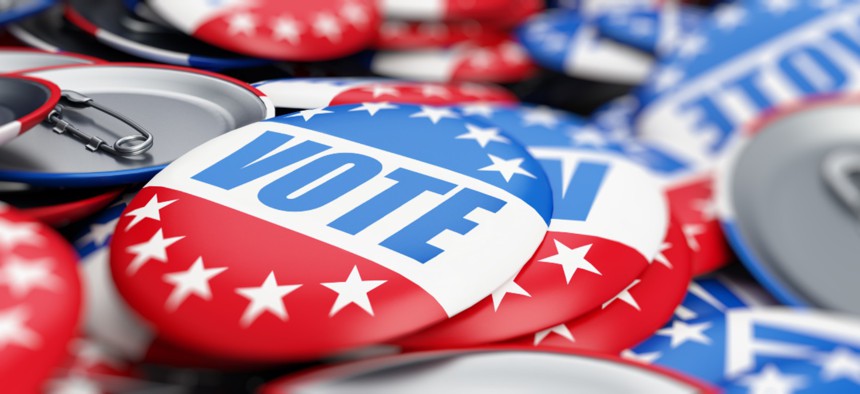
By 3dfoto / Shutterstock.com
Voting Flexibilities for Feds, and a TSA Leave Bill
A weekly roundup of pay and benefits news.
The Office of Personnel Management on Tuesday reminded agencies of the flexibilities they should provide to federal workers so that they can participate in November’s election.
In a memo to agency heads, acting OPM Director Michael Rigas reiterated that it is the federal government’s “longstanding policy” to grant limited excused absences so that federal employees can cast their vote in elections or volunteer as a nonpartisan poll worker.
Although the prevalence of early voting, longer polling hours in many states on Election Day and now vote by mail have made it so that providing time off from work to vote is “rarely needed,” managers should still authorize excused absences in some circumstances, OPM said.
“Generally, [OPM] has advised agencies that where the polls are not open at least three hours either before or after an employee’s regular work hours, an agency may grant a limited amount of excused absence to permit the employee to report to work three hours after the polls open or leave from work three hours before the polls close, whichever requires the lesser amount of time off,” Rigas wrote. “An employee’s ‘regular work hours’ should be determined by reference to the time of day the employee normally begins and ends his or her workday.”
Additionally, if an employee’s polling place is beyond normal commuting distance and they cannot vote absentee, an agency may grant one day off so that the worker may cast his or her ballot. Rigas also provided details on how agencies should handle providing time off so that workers can make use of early voting.
“Agencies should grant excused absence for early voting on a scheduled workday only when (1) the employee will be unable to vote on the day of the election because of activities directly related to the agency’s mission (such as Temporary Duty travel) and cannot vote by absentee ballot, or (2) early voting hours are the same as, or exceed, voting hours on the day of the election, in which case both the information [on excused absences for voting] applies,” Rigas wrote. “If an employee chooses to vote earlier, but the hours in which polling places are open are shorter than on Election Day, the employee is not eligible for excused absence because the employee has opted to vote at that time.”
Rigas also encouraged federal managers to provide excused absences when possible to employees who want to volunteer as election judges or for other nonpartisan work to administer the election.
“Historically, federal employees have been encouraged to make maximum use of the existing wide range of leave and work scheduling flexibilities available to them to perform community service, which may include service as poll workers,” Rigas wrote. “[Where] local jurisdictions are in need, the expertise of federal employees in interacting with citizens and dutifully [carrying] out non-partisan activity can be a welcome resource.”
Meanwhile on Capitol Hill, the House on Wednesday passed a bill to improve benefits for parents of young children at the Transportation Security Administration by a voice vote.
The TSA Personnel Workplace Improvement Act (H.R. 5811), introduced by Reps. John Katko, R-N.Y., and Lou Correa, D-Calif., would require the TSA to provide “adequate access” to clean and safe lactation facilities for agency employees who are nursing mothers. And it would correct a technical error in the law providing 12 weeks of paid parental leave to federal employees by clarifying that the new benefit is available to all TSA employees, not just screeners at the agency.
“This cadre of frontline workers continue to be among the lowest paid federal employees,” said Rep. Lauren Underwood, D-Ill. “This bill seeks to ease some of the burden on TSOs that are also juggling the care of small children.”
“I strongly support this legislation,” said Rep. David Joyce, R-Ohio. “Front line TSA personnel have continued to serve the travelling public during this pandemic, and I see this as an opportunity to express our appreciation of their service. It will ensure that employees have access to clean and free lactation facilities for an appropriate amount of time, and coordinate with the National Institutes of Health to ensure they meet necessary standards.”
The bill now goes to the Senate for consideration.







